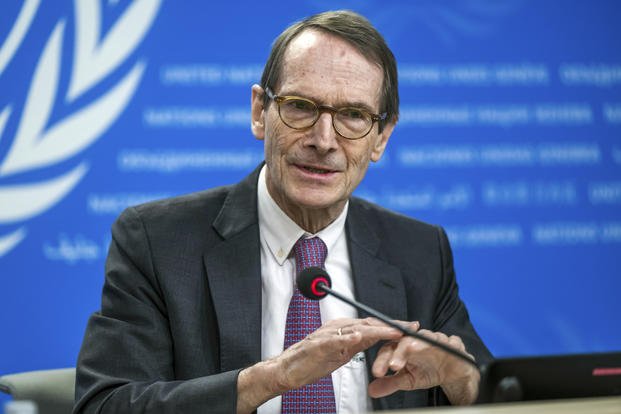GENEVA — U.N.-backed human rights experts said Friday they have gathered new evidence of “horrific” torture of Ukrainian prisoners of war by their Russian jailers, saying such practices could amount to war crimes.
The Commission of Inquiry on Ukraine said human rights violations have been widespread since Russian President Vladimir Putin ordered his troops to invade the country more than two years ago, and that civilian suffering from the war continues to mount.
“New evidence strengthens the commission’s previous findings that torture used by Russian authorities in Ukraine and in the Russian Federation has been widespread and systematic,” the commission said in its latest report, citing “horrific treatment” of POWs at several sites in Russia.
Last July, The Associated Press reported that thousands of Ukrainian civilians were being held in Russian prisons and subjected to systematic torture and slave labor. The AP report also cited a Russian government document from January last year outlining Moscow's plans to create dozens of new prison colonies and detention centers in occupied Ukraine through 2026.
Commission chair Erik Mose said the torture takes many forms including beating, verbal abuse, electric shocks, and limited access to food and water.
"The whole treatment of the prisoners of war and the picture drawn up emerging from the way they were dealt with, how they were treated over long periods -- months -- enables us to use the word ‘horrific,’” he told reporters on the sidelines of a Human Rights Council meeting in Geneva.
Russian forces regularly showed little regard for possible harm to civilians in their military operations, the report said, adding that incidents of rape and sexual violence against women in the war in Ukraine amounted to torture.
“Our determination is that both rape and sexual violence are war crimes," commission member Vrinda Grover said. "With the focus this time on prisoners of war, we have also found that there was a sexualized dimension of torture of male prisoners -- Ukrainian prisoners of war.”
Relocation of children from the Kherson region in southern Ukraine to Russian-occupied Crimea did not appear to be temporary, they said, and could amount to the war crime of unlawful transfer.
As for the Ukrainian side, the report cited “a few violations” of human rights by Ukrainian authorities against people suspected of collaborating with Russia.
The commission, mandated by the U.N.-backed rights council that is in the midst of a six-week session, said it conducted more than two dozen trips to Ukraine and drew on interviews of more than 1,400 men and women over the last two years.
In one case, a former Ukrainian detainee who was not identified described having his collarbone broken, teeth knocked out and injured foot beaten, among other mistreatment, until “he begged them to kill him,” the report said.
After release, he underwent 36 hospitalizations through January this year, Mose said.
While praising assistance from Ukrainian authorities, the team cited a “lack of cooperation” from Russian authorities and said it received no answer to its nearly two dozen requests for meetings, access and information.
Russia's diplomatic mission in Geneva had no immediate comment on the report.
The latest commission report builds on its first one issued last March, which raised the possibility that Russian forces had committed crimes against humanity through policies like military strikes on infrastructure to deprive Ukrainians of heat and electricity in the winter, as well as earlier signs of torture.











